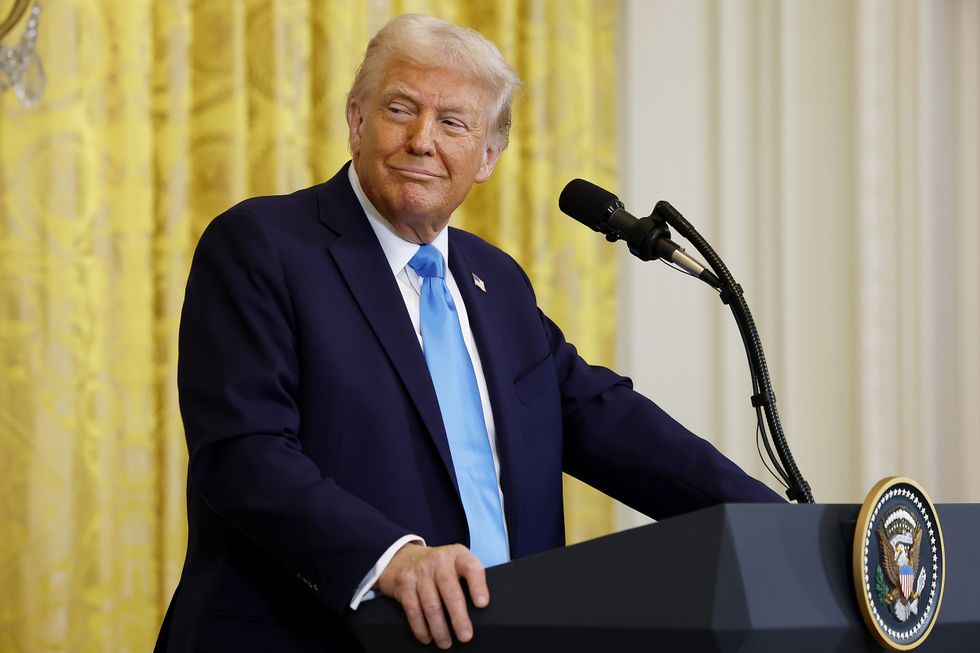Bold action. Steadfast commitment. When it comes to tackling illegal immigration and crime, as in all other matters, President Donald Trump demonstrates he means action. His plan to send American criminals to El Salvador’s notorious mega-prison, CECOT, is not only a strategic move but also a statement of leadership, especially when contrasted with the failures of the British political establishment in managing crime and immigration.
Trump’s approach, aimed at punishing violent offenders and deterring future crimes, sharply contrasts with Keir Starmer’s retreat from the Rwanda Plan. This stark difference in leadership underscores a critical gap. Recent polls show 55% of respondents support the idea of mass deportations reflecting Trump’s base’s approval of his decisive actions.
At the heart of this audacious move is a groundbreaking agreement with El Salvador’s President Nayib Bukele. The deal allows the U.S. to deport its most dangerous criminals—including American citizens—to CECOT, a prison designed to house 40,000 of the world’s most hardened criminals. Known as a “concrete and steel pit,” this facility is integral to Bukele’s aggressive anti-gang strategy, which has reduced crime in El Salvador by 50%. For Trump, the deal is about more than moving criminals abroad; it’s a declaration of sovereignty and justice aimed at reinforcing his mission to strengthen America. The benefits for El Salvador are clear: the country has seen a marked decrease in crime since Bukele’s crackdown. Why shouldn’t America take advantage of its’ world beating expertise?

Despite human rights laws concerns, Donald Trump’s resolve remains unwavering.
Getty Images
However, this approach raises concerns, with critics pointing to the harsh conditions at CECOT, which may violate international human rights laws. While these concerns are valid, Trump’s resolve remains unwavering. His supporters view the deal positively, reinforcing his commitment to national security. Critics, however, warn that it sets a dangerous precedent, shifting the burden of crime abroad rather than confronting it within the U.S.
The scheme serves as a powerful deterrent. By sending criminals abroad, Trump sends a message that breaking the law has consequences that extend beyond American borders. This strategy is not just about incarceration—it reinforces American values of law and order in a world that has become too lenient.
By contrast, Starmer’s Labour Party has effectively surrendered on immigration control, abandoning the Rwanda Plan. Originally designed to send unauthorised migrants to Rwanda, the Tories were unable to implement and Labour eventually abandoned it due to legal challenges and global opposition. This retreat signals a lack of conviction and failure to confront the issue head-on. At a time when UK net migration hit 728,000 last year, Starmer’s decision highlights Labour’s inability to take decisive action. Polls show 70% of Britons said immigration to the UK over the last 10 years has been too high, with 50% saying it has been “much too high, reflecting the failure to meet the public’s demand for stronger measures.
Keir Starmer’s hesitation reflects a broader issue: Labour’s fear of taking bold action. While Trump’s deal with El Salvador offers a direct solution to America’s crime problem, the Prime Minister’s vacillation highlights the paralyzing effect of legal and political fallout. By abandoning the Rwanda Plan, Labour missed an opportunity to address illegal immigration at its root, a move criticized by 55% of UK voters who believe stronger measures are needed for national security.

Starmer’s retreat into bureaucratic paralysis sends a signal of weakness, failing to meet the public’s demand for tangible change.
Getty Images
Trump’s deal with El Salvador could set a precedent for international cooperation on criminal justice. If successful, it could inspire other nations to share the burden of incarcerating dangerous offenders and help reduce global crime. However, it also raises the risk of countries shifting their crime problems abroad rather than confronting them within their borders.
How deeply tragic that Trump’s bold and unapologetic leadership—grounded in a clear vision of national sovereignty, law, and order—highlights the impotence of a leadership that dares not confront the most pressing challenges head-on. His strategy with El Salvador is more than a policy; it’s a daring declaration of the necessity for firm action in an era where indecision and political correctness have plagued global governance. While Trump is forging an international coalition to combat crime, particularly in a world where global threats know no borders, Starmer’s retreat into bureaucratic paralysis sends a signal of weakness, failing to meet the public’s demand for tangible change.
This contrast is not just about two political figures but the broader ideological battle between strength and surrender, action and appeasement. Trump’s move could be the beginning of a global shift—one where nations reclaim control over their security, unafraid to take risks and break with the status quo.
Meanwhile, Starmer’s hesitation mirrors a wider crisis of leadership in the West: a retreat from the responsibilities of nationhood, a fear to act in the face of crises that demand urgency. If history teaches us anything, it’s that only those nations which act decisively in the face of uncertainty can secure a future worth defending.